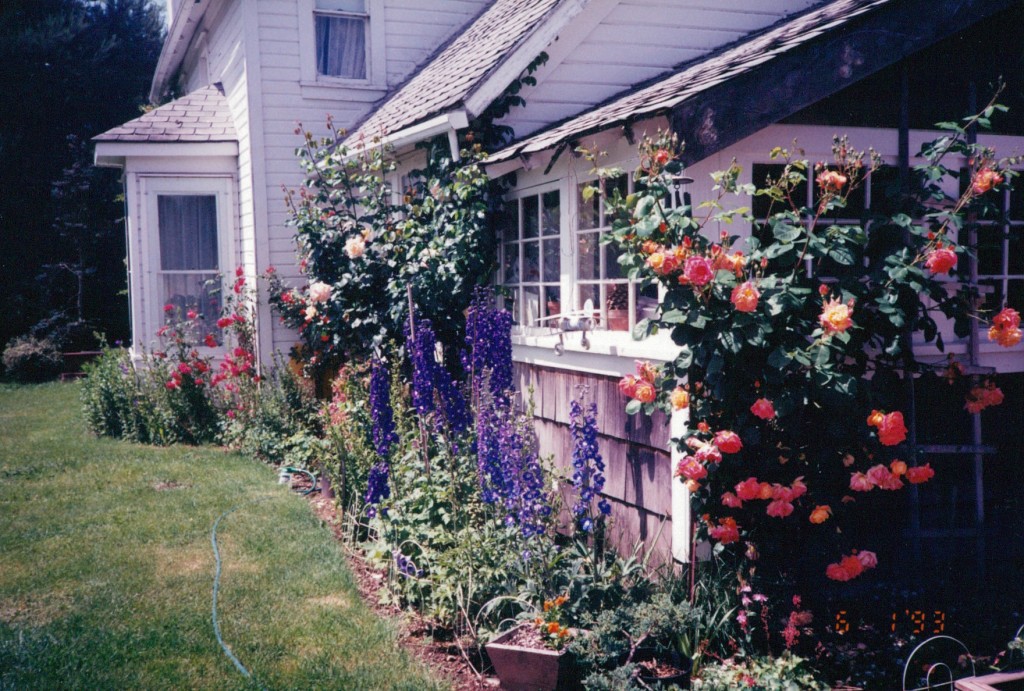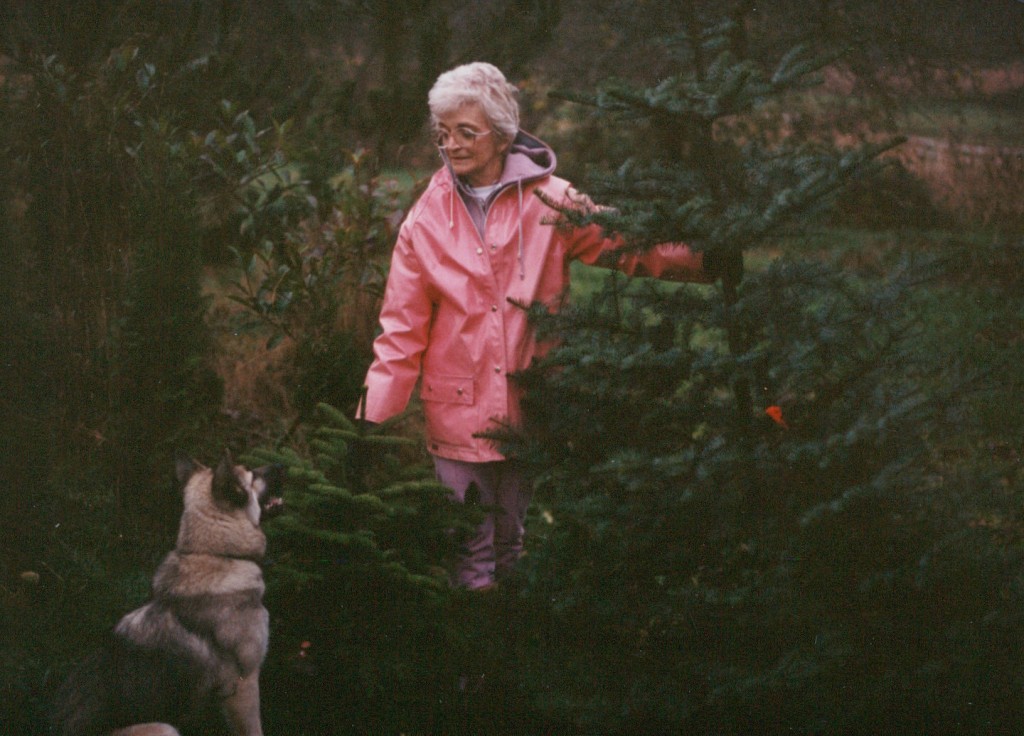I try to keep this blog on the professional side, but I had a few experiences yesterday that made me reflect on my grandmother, my work here in Japan, and aging more generally. I’ve written about Grandma and her family in a past post, and today I offer a little more, a little differently.
A few months ago, I joined the Board of the Truman Scholars Association, a non-profit that helps connect Truman Scholars around the US. I was named a Truman for Washington State in 2005. The program is a living memorial to President Harry S. Truman, and supports future leaders in public service.
Every year, Truman Scholars organize dinners for students who have been offered an interview in the final stage of the scholarship competition. Yesterday, I dialed in to the Pacific NW finalist dinner and met some incredible college students who are from or based in Washington, Oregon, Alaska, Idaho, and Montana. They are historians and political scientists and aspiring elected officials. They come from big cities, small towns, and refugee camps. I was humbled and inspired by the chance to learn about what kind of change they want to make in the world. Some will not be selected as Trumans, but I don’t doubt that all will go on to do incredible things.
During this dinner, we introduced ourselves and shared what inspires us. One of my fellow Washington State Trumans talked about his late Grandpa Charlie, a man who was born in the Great Smoky Mountains and put his family through the Depression by working at a rock quarry for 22 cents an hour. He joined the military and settled in Greenwood, Mississippi after WWII. This Truman noted that Grandpa Charlie had relentlessly pushed his children and then his grandchildren to seek education. “Anything I’ve achieved is on Grandpa Charlie’s shoulders,” he said. It was a beautiful tribute, and it resonated deeply.
I think about aging all the time here in Japan, but I often think of it as a macro phenomenon couched in statistics and economics. Really, aging is about people, and its impacts include less quantifiable things like cultural continuity. What of ourselves and our experiences do we want to pass on? What do we want to release? On the other side of the equation, what do those coming up behind us want to learn and therefore preserve? What are they willing to let go?
When I was seven years old, my grandma taught me to bake pies from scratch. When I lived in Memphis, I asked Grandma about Southern foods that I hadn’t seen her make when I was growing up. About grits and chicken waffles, her response was the same: as a poor girl growing up in rural Tennessee, this was what she ate when there was nothing else available. She had no desire to pass on that knowledge, and that’s not a loss. The choice was Grandma’s, and she chose to leave me plenty of other skills and stories that were more important to her. I will always think of her every time I make a pie.
Questions of cultural continuity are as old as social organisms, but when an entire society is aging, the issue of what to hold and what to let go is more visible, the stakes higher, the pressure more intense. In Hiroshima, a dedicated cadre of volunteers is working to preserve the stories of atomic bomb survivors. The youngest survivors are in their 70s and 80s, and for many, the trauma has not dimmed: they chose not to share their experiences of the bombing for the first 60-plus years of their lives. Now, there is a race to record those stories in new ways. One man started telling his story in his 80s, having been motivated to do so after hearing a talk by a fellow survivor in her 90s. I have a piece that I hope to share soon about Hiroshima and its memory keepers. They are at the frontiers of depopulation and culture in Japan, and their work has global implications.
The intangible losses that come with depopulation can feel deeply saddening and even frightening, but cultural evolution is a constant process. Some things are always being lost and eroded. I learned a while back about a small town in the mountains of Western Tokyo where festival dances are dying out. They’re too physically demanding for the old people, and the young people no longer come home for the annual celebration. These dances may very well be lost as a result of population aging, and while this story repeats itself around the country, there are also bright spots.
For example, I spent two hours interviewing Bjorn Heiberg, founder of Tower Knives. Bjorn is a businessman who is trying to preserve artisanal Japanese knife making by directing a bigger chunk of profits to the craftspeople themselves, and this has helped generate interest among apprentices. One master knife maker had planned to retire at 70, but instead took his first apprentices that year, one of whom is a young woman just out of high school. Bjorn believes good knives are the bedrock of Japanese cooking, and that flavorful food comes from a good knife. Lose the knives and the people who know how to make them, and you lose much more than a kitchen tool, but a way of life.
If we can see depopulation as something other than a one-dimensional threat, we can invent and evolve in ways that make life better. I’ve met or heard stories of many young Japanese people who are making a go of life outside of big cities, or sometimes weaving a life that oscillates between big cities and more regional or rural places. Some say this would have been unthinkable a few decades ago, yet everything changes, including seemingly intractable cultural preferences. Change isn’t necessarily loss — change that keeps something alive is adaptation, and it’s generally desirable.
The business world offers good examples, and it’s notable that many of the world’s oldest businesses are in Japan. A few months back, Foster and I stumbled into the shop of a 24th generation swordsmith in Kamakura. I recently bought tea from a shop in Odawara that was founded in 1661 and is run by the 17th generation of the same family. I’ve interviewed a 5th generation Buddhist priest whose friends include a 16th generation ceramicist. These businesses have certainly had their ups and downs, but they exist today because they adapted. We have plenty of good reason to be concerned about the economic impacts of depopulation, but from a cultural perspective, demographic shifts aren’t necessarily death or discontinuity. Sometimes they are, but sometimes they’re just another revolution of the wheel.
Between yesterday’s mention of Grandpa Charlie and some of these swirling thoughts about population decline, I found myself thinking today about how much I miss Grandma. I’m posting below a tribute I delivered at her memorial service before I left the US last year. It has nothing in particular to do with population decline in Japan, but everything to do with memory, stories, holding on, and letting go:
Illa Olene Sieloff passed away June 18, 2019, a mere 31 days shy of her 93rd birthday. She is survived by her children, Bruce Sieloff of Wenatchee, WA, Susan Hatz of Hillsboro, OR, and Mark Sieloff of Federal Way, WA as well as seven grandchildren and one great grandchild who, being both great and grand, eclipsed all others in Illa’s eyes. She lost her Southern accent but never her Appalachian cadence, baked fierce pies, and wore knee-high, high-heeled boots well into her 80s. She believed that accessories made the outfit, and when unable to select among various accoutrements, she wore them all.
Born Illa Olene Vaughn in Overton County, Tennessee on July 19, 1926, Illa was the fourth of eight children, raised among the hills and hollers of the Cumberland Plateau. Illa’s childhood was marked by adventures of the kind that are better in the telling, including near-drowning in the Obed River, narrowly avoiding the deadly bite of a Copperhead snake, and watching her home burn to the ground at age 8. Illa left Tennessee for Ann Arbor, Michigan at the age of 19. Her first major luxury purchase as an independent woman was a dual string of artificial pearls and a third pair of shoes. While waitressing in Ann Arbor, she and her girlfriends would down milkshakes in a fruitless effort to put curves on their naturally slender frames. It was during this period that she met Martin James Sieloff, a charming young man with a penchant for a bewildering Northern food called home fries. They eventually married and lived happily for the next 62 years, despite Martin’s father’s appalled observation to his son that “The woman has 12 pairs of shoes! How do you expect to support a woman who has 12 pairs of shoes?!”
Martin built Illa a house in Whitmore Lake, Michigan, laying the bricks with his own hands. She proved her love and devotion by raising her family in the house’s basement and waiting for the top story to be finished, a process that would take seven years. In 1968, the family relocated to Des Moines, Washington, where it proceeded to rain every day for the next three months. After drying out, Illa spent the next 51 years of her life in Washington, including 20 in Leavenworth, where she elevated the dirndl to haute couture and ran wild with a gang of Red Hat Ladies known to local authorities as the Bavarian Babes.
Illa loved babies, sweets, God, flowers, murder mysteries, trouncing anyone foolish enough to challenge her to a game of Rummikub, and learning that the girls at church couldn’t believe her age — not necessarily in that order. Illa loved to travel and her journey with Martin took her around the United States and across Europe several times. She loved to tell about being pinched in Italy when she was in her 50s.
She was thrilled to celebrate her 92nd birthday at a Mariners game, watching her beloved Mariners defeat the White Sox. It was the best present she could imagine, and she noted repeatedly for weeks afterward, “They even won for me!” This was fortuitous, as few things could ruin Illa’s day like a loss for the M’s.
From the beginning to the end, Illa was a fighter with a stubborn streak a country mile wide, a disposition that earned her the fond moniker “the Tennessee mule” in later years. She was endlessly loving, and will be missed and fondly remembered by all who knew her, especially every time her Mariners win.


Your grandma was a force! What an incredible woman! 🥰
On Sat, Mar 6, 2021 at 11:26 AM Mostly City Stuff wrote:
> Sarah S posted: ” I try to keep this blog on the professional side, but I > had a few experiences yesterday that made me reflect on my grandmother, my > work here in Japan, and aging more generally. I’ve written about Grandma > and her family in a past post, and today I offer ” >
LikeLike